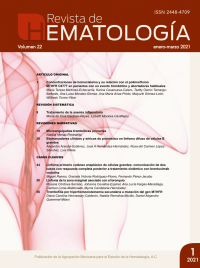Homocysteine levels and their relationship with the MTHFR C677T polymorphism in patients with a thrombotic event and habitual abortions.
Rev Hematol Mex. 2021; 22 (1): 1-8. https://doi.org/10.24245/rev_hematol.v22i1.4937
María Teresa Martínez-Echevarría,1 Karina Casanueva-Calero,2 Teddy Osmin Tamargo-Barbeito,3 Ana Luisa Morales-Gómez,4 Ana María Arias-Prieto,5 Maiyurik Gómez-León,6 Wilfredo Torres-Yibar7
1 Investigador agregado. Instructor. Laboratorio de Genética Molecular.
2 Especialista en Bioquímica. Instructor. Laboratorio de Genética Molecular.
3 Especialista en Bioestadística. Investigador titular. Profesor titular. Departamento de Investigaciones.
4 Especialista en Laboratorio Clínico. Laboratorio Clínico.
5 Profesor auxiliar. Laboratorio Clínico.
6 Especialista en Hematología. Instructor. Laboratorio Clínico.
7 Especialista en Hematología. Investigador titular. Profesor titular. Laboratorio Clínico.
Hospital Clínico Quirúrgico Hermanos Ameijeiras, La Habana, Cuba.
Resumen
ANTECEDENTES: La hiperhomocisteinemia se asocia con mayor riesgo de eventos trombóticos. Se plantea que los genotipos heterocigoto CT y homocigoto TT del gen de la metilentetrahidrofolato reductasa (MTHFR) constituyen un factor de riesgo para su aparición.
OBJETIVO: Caracterizar las concentraciones séricas de homocisteína y su relación con el polimorfismo MTHFR C677T en adultos jóvenes cubanos.
MATERIALES Y MÉTODOS: Estudio descriptivo de serie de casos transversal, efectuado de septiembre de 2017 a diciembre de 2018 en un grupo de pacientes con edades comprendidas entre 18 y 50 años, de uno y otro sexo. Las concentraciones séricas de homocisteína se determinaron mediante el método comercial de CPM y la detección del polimorfismo MTHFR C677T mediante un estuche comercial de Roche.
RESULTADOS: Se incluyeron 50 pacientes. El 84% (n = 42) tenía concentraciones normales de homocisteína y solo el 16% (n = 8) tenía concentraciones elevadas. No encontramos asociación entre las concentraciones de homocisteína y el sexo, el color de la piel y el diagnóstico clínico. Se encontró asociación (p = 0.011) entre la hiperhomocisteínemia y el genotipo TT del polimorfismo MTHFR C677T.
CONCLUSIONES: La hiperhomocisteinemia no constituye la causa más frecuente del evento trombótico en adultos jóvenes cubanos con eventos trombóticos y abortadoras habituales y se asocia con el genotipo TT del polimorfismo MTHFR C677T.
PALABRAS CLAVE: Hiperhomocisteinemia; MTHFR; trombosis venosa profunda; ictus; abortadoras habituales.
Abstract
BACKGROUND: Hyperhomocysteinemia is associated with an increased risk of thrombotic events. The heterozygous CT and homozygous TT genotypes of the methylenetetrahydrofolate reductase (MTHFR) gene are considered a risk factor for its development.
OBJECTIVE: To characterize the serum levels of homocysteine and its relationship with the MTHFR C677T polymorphism in young Cuban adults.
MATERIALS AND METHODS: A descriptive study of a transversal case series was carried out from September 2017 to December 2018 in a group of patients aged between 18-50 years, of both sexes. Serum homocysteine levels were determined using the commercial CPM method and detection of the MTHFR C677T polymorphism was performed using a Roche commercial kit.
RESULTS: There were included 50 patients; 84% (n = 42) presented normal homocysteine levels and only 16% (n = 8) had elevated levels. We found no association between homocysteine levels and gender, skin color, and clinical diagnosis. An association (p = 0.011) was found between hyperhomocysteinemia and the TT genotype of the MTHFR C677T polymorphism.
CONCLUSIONS: Hyperhomocysteinemia is not the most frequent cause of the thrombotic event in Cuban young adults with thrombotic events and habitual abortion, and it is associated with the TT genotype of the MTHFR C677T polymorphism.
KEYWORDS: Hyperhomocysteinemia; MTHFR; Deep venous thrombosis; Stroke; Habitual aborters.
Recibido: diciembre 2020
Aceptado: marzo 2021
Este artículo debe citarse como: Martínez-Echevarría MT, Casanueva-Calero K, Tamargo-Barbeito TO, Morales-Gómez AL, et al. Concentraciones de homocisteína y su relación con el polimorfismo MTHFR C677T en pacientes con un evento trombótico y abortadoras habituales. Hematol Méx. 2021; 22 (1): 1-8.

